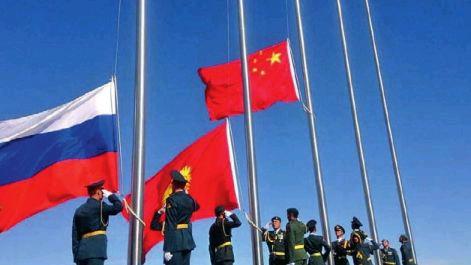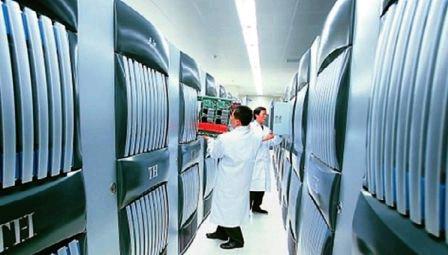Focus


Voices
“Tibet has been visibly transformed by uninterrupted double-digit GDP growth over two decades and has entered a new stage of development… As a result of this development, Tibets interaction and integration with the rest of China has deepened and its isolation from the rest of the world has been decisively ended,”
said Narasimhan Ram, chairman of Indias Kasturi & Sons Limited, which publishes the countrys largest Englishlanguage newspaper The Hindu, at the forum on the development of Tibet in Lhasa in mid-August.
He believes the defining factors behind Tibets overall development include massive financial and resource support provided by the Chinese government, its preferential policies for Tibet, rapid infrastructure development and construction of a comprehensive modern transportation system.
Around 100 representatives from around the world convened for the two-day forum.
“The use of chemical weapons by Japanese militarists is an outrageous crime against China and the world at large. Destroying the remains of such weapons is a key component of Chinas implementation of the Convention on the Prohibition of the Development, Production, Stockpiling and Use of Chemical Weapons and on Their Destruction. China must dispose of them completely and as soon as possible in order to eradicate the menace to the property and health of residents and the environment in relevant regions of the country.”
Vice Minister of Industry and Information Technology Liu Lihua made these remarks during a recent inspection tour of Jilin Province in Northeast China. He urged authorities and local governments of concerned regions to collaborate on the destruction of chemical weapons left behind by Japanese invaders during the War of Resistance against Japanese Aggression, so contributing to the safety of relevant industries, national interests and world peace.
On Chinese Media
China Economic Weekly
Issue No. 33, published on August 25, 2014
Advancing Fiscal and Tax System Reforms
On June 30, a plan for reforming Chinas fiscal and tax systems was reviewed and adopted by the Political Bureau of the CPC Central Committee. Its priorities include improving management and supervision of government budgets, deepening tax system reform, and adjusting fiscal relations between central and local governments to make their power commensurate with spending responsibilities. In addition, a timetable was set: Key tasks in the new round of fiscal and tax reforms are expected to be fulfilled by 2016, and a modern fiscal system will be basically established by 2020.
The current round of fiscal and tax reforms can be compared with the tax reforms of 1994, but with a different focus. The 1994 reforms prioritized allowing central authorities to play the dominant role in the distribution of financial revenues. However, this new round of reforms aim to establish a modern fiscal system, across wider fields, while retaining the current division of financial resources between central and local governments.
Finance Minister Lou Jiwei stated, “The 1994 reform was launched to regulate the distribution of revenues between central and local governments and enterprises. Our main tax categories were hence established. After 20 years of development, our tax system has been modified in order to strengthen public finance and improve ordinary peoples lives. Therefore, by deepening fiscal and tax system reform, we dont mean to tinker with current policies, but to innovatively restructure current systems so as to serve the countrys overall reforms and future development.”
Oriental Outlook
Issue No. 32, published on August 21, 2014
Deng Xiaopings Conception of Chinas Systems
Deng Xiaoping once said, “To judge the success of our Party and countrys systems, the most important yardstick is their ability to achieve the three goals.” The three goals he mentioned were: outperforming the capitalist world in economic achievements, creating a more successful and practical democracy, and cultivating talents.
In his 1992 inspection tour of South China, Deng predicted, “Im afraid that it will take 30 years to form a full set of more mature and stable state systems. Only then will policies and principles under the framework of these systems be firmly established.”
President Xi Jinping has expressed his determination to achieve the same goal in the same time frame. Xi said,“Today, the major historic task facing us is to improve our socialist system to make it more mature and stable, in order to guarantee our Party and countrys development, the peoples well-being, social harmony and longterm political stability.”
Undoubtedly, today China has come to a critical moment in the course of reforms. Obviously, it will never choose a Western “threebranches” system of government. Despite the difficulties entailed in reforms, President Xi is just as confident as Deng Xiaoping was about the road the country is following.
When commemorating the 110th anniversary of Deng Xiaopings birth, a review of his ideas about the country and Partys system can give us a clearer understanding of Chinas future.
Economy & Nation Weekly
Issue No. 18, published on September 1, 2014
Shenzhens Exploration in Innovation
Despite lacking first-rate universities and high-ranking research institutes, Shenzhen is home to a flock of corporate giants including Huawei, Tencent and BGI.
Some commenters attribute Shenzhens remarkable development to the favorable policies it enjoys as a special economic zone, the stock exchange in the city, and its abundance of capital resources. A cynical observer might add that part of Shenzhens prosperity comes from imitating the innovations of others.
An investigation team from Economy & Nation Weekly headed for Shenzhen for answers. According to recently released statistics, Shenzhens economy is buttressed by six strategic emerging industries: biology, Internet, green energy, new materials, IT, and cultural creativity. They account for 40 percent of the citys GDP. Sci & tech innovations have become the major engine for Shenzhens economic development.
In a 2012 study the magazine discovered multiple problems among Chinese enterprises and research institutes that stifle innovations. In this issue our editorial team first present our debates and various views about Shenzhen, and then explore whether the city has successfully addressed its problems in innovation.
Economic Weekly
Issue No. 17, published on August 25, 2014
Setbacks Cant Deter Foreign Tech Companies in China
In 2012 Luis von Ahn created Duolingo, a language learning platform. As of the end of April, Duolingo offered English lessons to Chinese speakers, attracting one million users in the first week after its release. However, a week later many users were unable to register.
Luis said on the Duolingo forum that it is not clear whether or not Duolingo is intentionally blocked by the Chinese government. Duolingo staff inferred that the blockage might be due to political content. This speculation was soon denied, as the problem only affects China Unicom subcribers. However, the problem was automatically solved in the afternoon of May 12. All users can now access to the Duolingo app.
Some foreign entrepreneurs, like Luis, knew little about Chinese market conditions before entering the country. To some extent, China is a Bermuda Triangle for global tech companies, but who can resist the lure of Chinas 527 million mobile Internet users? In the past few years, China has become a cradle for world-level enterprises in such sectors as social networking, e-commerce and Internet finance. Since 2012, technology companies such as Line, Evernote, AWS, Uber and Linkedin have all fought for footholds in the Chinese market.
Directors & Boards
Issue No. 8
Chinese Style“Partnership”
In 2013, the film American Dreams in China triggered heated debates in Chinese society.
Partnership businesses have been officially permitted in China since 1997, when they were recognized as a separate category from corporations defined in the 1993 Company Law. The Partnership Law was amended in 2006, and a statute on the income tax on business partners was promulgated in 2008. This triggered a surge in private equity investment, accompanied by an improving business climate for startups. The number of partnership enterprises has seen explosive growth.
The first partnership enterprises included accounting and law firms, which provide professional knowledge and skills to clients. These firms are categorized as “special general partnerships.” Here the “special” refers to the partners liabilities under different circumstances.
Today partnership enterprises are no longer peculiar to “intelligence-intensive enterprises” in high-end sectors. Many startup partnerships in low-tech sectors are also thriving.
Exchanges
Chinese, Australian FMs Host Diplomatic and Strategic Dialogue
On September 7 Chinese Foreign Minister Wang Yi and his Australian counterpart Julie Bishop co-hosted the second round of China-Australia Diplomatic and Strategic Dialogue in Sydney. Wang Yi said that bilateral relations have maintained an optimistic momentum. To enhance bilateral ties, both sides need to promote mutual trust and mutual benefit as well as enrich the connotations of the bilateral strategic partnership. Bishop pointed out that the two countries have upheld frequent highlevel exchanges, flourishing economic and trade cooperation, thriving cultural exchanges, and good coordination and cooperation in international and regional affairs. Australia is willing to deepen and expand the strategic cooperative relationship with China based on mutual respect and benefit to bring Australia-China relations to a new level. During the dialogue, Wang also raised the “Four Respects” regarding the South China Sea issue. The first is to respect historical facts, the second to respect international regulations, the third to respect direct dialogue and consultation between the countries involved, and the last to respect joint efforts by China and ASEAN to safeguard peace and stability in the South China Sea.
Chinese Company Completes Angolas Fastest Railway
China Railway Construction Corporation Limited finished building a massive railway line in Angola on August 13 and plans to put it into operation this year. The 1,344-km-long Benguela Railway connects the Atlantic port of Lobito in the west to the eastern town of Luau that borders the Democratic Republic of Congo. The 67-station railway has a design speed of 90 km/h and involved a total investment of US $1.83 billion. It is the longest and fastest track in Angola. The railway, built according to the EPC (engineering, procurement, construction) contracting agreement form, not only adopted Chinese standards, but also procured all building materials and equipment from China including steel rails, cement, communication devices, and large machinery. The project employed some 100,000 Angolans during construction and trained over 10,000 locals to be technicians.
SCO Carries out Live Fire Drill
Member states of the Shanghai Cooperation Organization(SCO) carried out Peace Mission 2014, a military drill, in Zhurihe training base in Inner Mongolia Autonomous Region from August 24 to 29. More than 7,000 troops took part in the drill, involving ground, air, special operations, and airborne troops using support from electronic countermeasures, reconnaissance, mapping and positioning units. More than 19 different models made up a group of about 70 aircrafts dispatched for the drill, including early warning aircrafts and fighter planes. Other weaponry such as tanks and antitank missiles were also deployed. Chinas military drones, the domestically produced WZ-10 and WZ-19 attack helicopters, made their first appearance in the multinational drills. The 2014 event has exceeded previous drills held among the SCO member states since 2005 in scale of military cooperation. The joint drill demonstrated the strong capability of SCO members to fight against the three evils of terrorism, separatism, and extremism.
Romanian Prime Minister Visits China
Romanian Prime Minister Victor-Viorel Ponta paid an official visit to China from August 31 to September 2. In meeting with Ponta, Chinese President Xi Jinping said China highly appreciates Romanias firm support on issues involving Chinas core interests and major concerns. This year marks the 65th anniversary of their diplomatic relations and the 10th anniversary of their comprehensive friendly cooperative partnership. Xi said he looks forward to new progress in the bilateral relationship in the future. Ponta said Romania values Chinas important role in promoting world peace and development and will continue to firmly support Chinas efforts to safeguard national sovereignty and territorial integrity. During his talks with Ponta, Chinese Premier Li Keqiang suggested that both countries advance energy cooperation, including nuclear, thermal, and wind power, and speed up a joint study on the construction of the BucharestConstanta high-speed railway. Li also called for exploration into potential technological, trade and investment cooperation in agriculture. Ponta, on his part, said Romania is a reliable partner and friend of China in the European Union and in Central and Eastern Europe(CEE). Romania will continue to play an active role in promoting EU-China relations and the cooperation between CEE countries and China. After their talks, Li and Ponta witnessed the signing of cooperation deals covering energy, finance, and infrastructure construction.
Society
Great Wall Foundation Established
A commemorative meeting was held at the Great Hall of the People on September 1 to mark the 30th anniversary of late Chinese leaders Deng Xiaoping and Xi Zhongxuns inscriptions “Love Our China, Repair Our Great Wall.” The event also announced a new foundation to preserve the ancient defense edifice. Impressive achievements have been made in the protection of the Great Wall over past decades. But preservation efforts in less developed regions continue to suffer from lack of personnel, poor planning and underfunding. The new foundation is expected to facilitate preservation work. Donations made at the inauguration totalled RMB 18.19 million.
FM to Open Consular Protection Emergency Call Center
After extending its reach through modern communication tools, including instant messaging and Wechat, the Ministry of Foreign Affairs has set up an emergency call center for global consular protection and services, now in trial operation. The hotline number is 12308, with a backup number 59913991 for Chinese citizens in countries and regions where the first number is not accessible. The call center works around the clock, all year round. According to public security authorities, in the first half of 2014 Chinese people made 54 million outbound trips, up 18.33 percent from the previous year. More than 20,000 Chinese companies are operating in nearly 200 countries and regions across the world.
China Ranks 28th Globally in Competitiveness
On September 3, the World Economic Forum (WEF), a Geneva-based non-profit organization, released its Global Competitiveness Report for 2014-2015. The report assesses the competitiveness landscape of 144 economies, providing insight into the drivers of their productivity and prosperity. For the sixth year in a row, Switzerland led the pack, followed by Singapore and the U.S. China ranked 28th, the highest spot among BRICS countries. The report is based on data collected by the UN, the World Bank, the IMF and WEF around the world.
WWII Sites and Heroes Named
The State Council released a list of 80 national facilities and sites commemorating the antiJapanese war ahead of the 69th anniversary of the countrys victory, which falls on September 3. Lugou Bridge in Beijing and the Memorial Hall for the Victims of the Nanjing Massacre are among the sites listed. Meanwhile, the Ministry of Civil Affairs announced a list of 300 martyrs and heroic groups who sacrificed their lives during resistance against Japanese invasion in the 1930s and 40s. These include CPCled and KMT-led armed forces, Chinese civilians and international figures. Foreign participants are also among those honored, including American pilot McCawley Robert Short, Polish journalist Hans Shippe and Canadian doctor Norman Bethune.
Activity
Violin Recital by Julia Bushkova
Date: October 4, 2014
Place: Shanghai Oriental Art Center
Price: RMB 50/120/180/300
Born into a family of renowned violinists in Moscow, Julia Bushkova began to play the violin at the age of five and made her debut aged 15 in Poland. She graduated with summa cum laude from the Tchaikovsky Conservatory. Her performance is highly praised by master violinist Joseph Gingold. Pianist Arsentiy Kharitonov, who has won numerous national and international competitions, will join Bushkova at this recital. His first orchestral appearances as a young musician included performances with the St. Petersburg Philharmonic Orchestra and the Mariinsky Theatre Youth Philharmonic Orchestra.
Mariah Carey 2014 Tour in Chengdu
Date: October 12, 2014
Place: Chengdu Sports Center
Price: RMB 180/280/380/480/680/980/1280/1680
As one of the most popular female vocalists, Mariah Carey has sold more than 200 million albums all over the world and has had 18 No.1 singles recorded in Billboard, which exceeds records set by the likes of Elvis Presley and Michael Jackson. She has won five Grammy Awards and is credited with innovating modern pop music with her impressive five-octave vocal range. She was one of the first pop singers to use the high-pitched “whistle register” in singing and she enjoys a global fan base.
Economy
Shanghai International Gold Trading Center Starts Operation
The Shanghai International Gold Trading Center was recently launched as the first international trading platform in China (Shanghai) Pilot Free Trade Zone (FTZ). The Shanghai FTZ is also preparing to establish other international trading centers.
In the Shanghai gold trading center, foreigners are allowed to invest in Chinas gold market. According to Li Jun, deputy secretary-general of the Shanghai FTZ management committee, financial markets and trading platforms within the FTZ are encouraged to use RMB to conduct transactions and settlements.
Many enterprises have benefited from the open financial policies in the Shanghai FTZ. By the end of July, traders in the FTZ had clinched 78 offshore RMB loan deals with a total value exceeding RMB 17 billion. Due to the low cost of the offshore funds, financing costs for enterprises within the FTZ are expected to decline by 10-20 percent.
Individual investors are also expected to benefit from the open financial sector in the FTZ. Li says that the Shanghai FTZ is exploring ways to facilitate cross-border investments for individuals, allowing domestic investors to invest abroad and encouraging foreign investments from abroad. These deals, it is hoped, will cover both the real economy and securities and futures.
Chinas Fast-moving Consumer Goods Market Saturated, Leaving Less Room for New Products
Chinas fast-moving consumer goods market is becoming saturated with a wide variety of consumer products, making it more difficult for new product launches to achieve incremental growth, recent research has found.
Fast-moving consumer goods (FMCG) refer to food and non-food everyday consumer products that are sold quickly and at relatively low cost.
According to a market study, FMCG brands should aim for innovations that can bring incremental growth, rather than becoming the biggest seller in the market. The study was jointly conducted by research company Kantar Worldpanel China and pollster TNS, which analyzed 210,000 new products launched in 77 categories over the past three years in China.
The research results showed that 45 percent of new products launched in China stayed on the shelf after three years, 19 percent gained incremental volume, while only four percent became big winners.
Alipay and Huawei to Promote Mobile Fingerprint Payment
Chinas largest third-party payment platform, Alipay, is joining forces with telecommunications giant Huawei to develop a service allowing smart phone users to make online payments using fingerprint verification, a first in China.
The cutting-edge service will be applied on Huaweis flagship smartphone Ascend Mate 7, the first domestically-produced smartphone to support fingerprint payment, and the second worldwide after Samsungs S5. This also marks the first cooperation between a Chinese hardware manufacturer and service provider in the field of mobile payments.
The jointly-developed service will be only applied to smartphones with Android systems, as Apple IOSs Touch ID is not yet open to thirdparty developers.
User security is protected by a specific technology that prevents third-party applications from being able to read the fingerprints. In addition, the smartphone installed with the service will encrypt key information from the fingerprint without saving a complete image.
China Remains Worlds Largest Trademark Applicant
China continues to lead the world in trademark application, with a cumulative sum of 14.257 million trademark applications and 9.075 million registrations. There are 7.611 million valid registered trademarks, according to data released by the State Administration for Industry & Commerce. Since 2002, China has led the world in the number of annual trademark applications.
Zhang Mao, director of the SAIC, downplayed the surging number of trademarks, saying only a small proportion of Chinese brands are well known in the international market.
He pointed out that Chinese enterprises are overreliant upon cost advantage. Only 20 percent of export-oriented firms have their own brands, Zhang said, and just 11 percent of Chinas exports are sold under domestic brands.
Zhang promised stronger efforts to safeguard intellectual property, including trademarks, especially wellknown brands, which are more vulnerable to vicious vying for trademark registration.
Sci-Tech
Chinas Supercomputer Helps Construct “Smart Cities”
Developers of Chinas Tianhe-1A, one of the worlds fastest supercomputers, are tapping into the digital brains higher functions, moving it beyond animation and Internet financing to help in the construction of new “smart cities.” The Tianhe-1A can digitize the planning, design, construction, and property management of buildings in Tianjins Binhai New Area, according to Meng Xiangfei, head of the applications department of the National Supercomputer Center in Tianjin. Everything from costs and building materials, down to which types of cement and steel are needed, can be calculated through the computers virtual design software before a new building is completed, he said. “For example, big data-based modeling of a subway project can reduce construction costs by 10 to 20 percent,” said Meng, adding that the big data platform has already been used in underground construction projects. In the future, Tianhe-1A will achieve massive data calculation, analysis and storage for Binhai New Areas urban planning, weather forecasting, biomedicine, equipment manufacturing, and car crash simulations.
New Zealand, China Create Lab for Joint Kiwi Research
Cao Jianlin, Chinas Vice Minister of Science and Technology, and Paul Stocks, Deputy Chief Executive at New Zealands Ministry of Business, Innovation and Employment, attended the signing ceremony for their agreement on the China-New Zealand joint laboratory for kiwifruit research in Auckland, New Zealand on August 31. According to Cao, the new lab will further enhance cooperative research on kiwis and related industrial development, a major contribution to both countries scientific and economic development and farmers livelihoods. Built under the China-New Zealand intergovernmental science and technology cooperation framework, the lab will focus on conservation and evaluation of kiwifruit germplasm resources, molecular genetics research, pest control, and safe production technology, as well as exchanging and training new talents.
Chinese OS Expected to Debut in October
According to Ni Guangnan, academician of the Chinese Academy of Engineering, Chinas homegrown operating system (OS) may be available by October. The OS will first be released for desktops and later for smartphones and other mobile devices. “China has more than a dozen mobile OS developers with no independent intellectual property rights because their research is customized for Android,”Ni said, adding that future development should be led by the government. According to Ni, the end of Windows XP and the government ban on the procurement of Windows 8 have opened the door to domestic OS developers.“Our success will depend upon an environment that can help us compete with Google, Apple and Microsoft,” Ni said.
Chinese Atomic Clock Given International Recognition
A Chinese atomic clock has been accepted by international authorities as a primary basis for high-precision international atomic time, announced the National Institute of Metrology (NIM). The cesium atomic clock, known as NIM-5 and developed by the institute, is a kind of extremely accurate time-keeping device. It can be accurate to within one second over 20 million years, according to Chinese media. The nod from the Paris-based Bureau International des Poids et Mesures, the authority for international time and frequency standards, has made China the eighth country to calibrate the international atomic time, after France, the United States, Germany, Italy, Japan, the UK and Russia. Insiders said the clock could define a Chinese atomic time independent from GPS signals or other international time-keeping data.
China, France to Build Advanced Biosafety Lab
During the recent SinoFrance Health Forum held in Beijing, more than 400 health officials, scholars and business representatives from the two countries discussed such topics as disease prevention and control, geriatric health, and hospital management. According to Chen Zhu, vice-chairman of the Standing Committee of the National Peoples Congress, the two countries will further cooperate in the fields of public health and explore new ways to aid developing countries under the framework of the World Health Organization. “China and France are active participants in the global fight against Ebola and are increasing cooperation on epidemic control and research. We are starting a new chapter in dealing with global emergencies,”said Ma Xiaowei, Vice Minister of National Health and Family Planning Commission of China. According to Sylvie Bermann, French ambassador to China, China and France are jointly building a top-level biosafety laboratory in Wuhan, Central Chinas Hubei Province, which will be equipped with the capacity to research infectious viruses, such as Ebola. The biosafety lab is expected to enhance both countries capacity for outbreak control and prevention.

